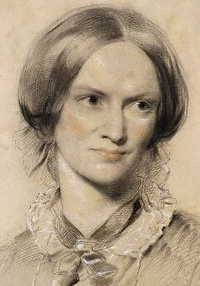Pleasure
Charlotte Brontë 1816 (Thornton, West Yorkshire) – 1855 (Haworth)
A Short Poem or Else Not Say I
True pleasure breathes not city air,
Nor in Art's temples dwells,
In palaces and towers where
The voice of Grandeur dwells.
No! Seek it where high Nature holds
Her court 'mid stately groves,
Where she her majesty unfolds,
And in fresh beauty moves;
Where thousand birds of sweetest song,
The wildly rushing storm
And hundred streams which glide along,
Her mighty concert form!
Go where the woods in beauty sleep
Bathed in pale Luna's light,
Or where among their branches sweep
The hollow sounds of night.
Go where the warbling nightingale
In gushes rich doth sing,
Till all the lonely, quiet vale
With melody doth ring.
Go, sit upon a mountain steep,
And view the prospect round;
The hills and vales, the valley's sweep,
The far horizon bound.
Then view the wide sky overhead,
The still, deep vault of blue,
The sun which golden light doth shed,
The clouds of pearly hue.
And as you gaze on this vast scene
Your thoughts will journey far,
Though hundred years should roll between
On Time's swift-passing car.
To ages when the earth was yound,
When patriarchs, grey and old,
The praises of their god oft sung,
And oft his mercies told.
You see them with their beards of snow,
Their robes of ample form,
Their lives whose peaceful, gentle flow,
Felt seldom passion's storm.
Then a calm, solemn pleasure steals
Into your inmost mind;
A quiet aura your spirit feels,
A softened stillness kind.
Font size:
Submitted on May 13, 2011
Modified on May 03, 2023
- 1:17 min read
- 332 Views
Quick analysis:
| Scheme | X ABAB CXCX DEDE FGFG HIHI FJFJ KLKL MNMN GOXO PEPE QRQR |
|---|---|
| Closest metre | Iambic tetrameter |
| Characters | 1,417 |
| Words | 252 |
| Stanzas | 12 |
| Stanza Lengths | 1, 4, 4, 4, 4, 4, 4, 4, 4, 4, 4, 4 |
Translation
Find a translation for this poem in other languages:
Select another language:
- - Select -
- 简体中文 (Chinese - Simplified)
- 繁體中文 (Chinese - Traditional)
- Español (Spanish)
- Esperanto (Esperanto)
- 日本語 (Japanese)
- Português (Portuguese)
- Deutsch (German)
- العربية (Arabic)
- Français (French)
- Русский (Russian)
- ಕನ್ನಡ (Kannada)
- 한국어 (Korean)
- עברית (Hebrew)
- Gaeilge (Irish)
- Українська (Ukrainian)
- اردو (Urdu)
- Magyar (Hungarian)
- मानक हिन्दी (Hindi)
- Indonesia (Indonesian)
- Italiano (Italian)
- தமிழ் (Tamil)
- Türkçe (Turkish)
- తెలుగు (Telugu)
- ภาษาไทย (Thai)
- Tiếng Việt (Vietnamese)
- Čeština (Czech)
- Polski (Polish)
- Bahasa Indonesia (Indonesian)
- Românește (Romanian)
- Nederlands (Dutch)
- Ελληνικά (Greek)
- Latinum (Latin)
- Svenska (Swedish)
- Dansk (Danish)
- Suomi (Finnish)
- فارسی (Persian)
- ייִדיש (Yiddish)
- հայերեն (Armenian)
- Norsk (Norwegian)
- English (English)
Citation
Use the citation below to add this poem to your bibliography:
Style:MLAChicagoAPA
"Pleasure" Poetry.com. STANDS4 LLC, 2024. Web. 31 Oct. 2024. <https://www.poetry.com/poem/5522/pleasure>.



Discuss the poem Pleasure with the community...
Report Comment
We're doing our best to make sure our content is useful, accurate and safe.
If by any chance you spot an inappropriate comment while navigating through our website please use this form to let us know, and we'll take care of it shortly.
Attachment
You need to be logged in to favorite.
Log In